| Srl | Item |
| 1 |
ID:
176063
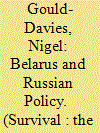

|
|
|
|
|
| Summary/Abstract |
The historical pattern, as well as geopolitical and regime-security considerations, indicate that Russia is unlikely to agree to Belarus’s democratic transition.
|
|
|
|
|
|
|
|
|
|
|
|
|
|
|
|
| 2 |
ID:
187256
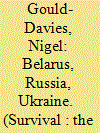

|
|
|
|
|
| Summary/Abstract |
Belarus’s recent arc offers three wider lessons for winding down the present international crisis over the Russia–Ukraine war and for planning the post-war order. Firstly, highly personalistic rule is prone to error. The flagrancy of Belarusian leader Alyaksandr Lukashenka’s electoral rigging ignited popular indignation, and the extreme brutality of the ensuing crackdown fanned popular outrage. Secondly, and paradoxically, autocracy is strong. Lukashenka’s tight control over all institutions of the state enabled him to prevent elites from defecting or losing the will to resist. Thirdly, ambiguities and compromises are unstable, and must sooner or later give way to clarifying choices. The post-war order must embed decisive outcomes, not unsustainable compromises. The West’s challenge is to enmesh a stable Ukraine in a wider peace that, for the third time in a century, builds a durable security order in Europe.
|
|
|
|
|
|
|
|
|
|
|
|
|
|
|
|
| 3 |
ID:
192138
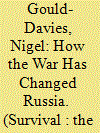

|
|
|
|
|
| Summary/Abstract |
Russia’s war in Ukraine is changing Russia itself. It is subordinating stability and prosperity to geopolitical obsession, and is mobilising society around active support for costly, indefinite aggression. This is breaking stabilising bargains the regime has struck at home with elites and the wider population. The system is not yet close to crisis, but the strains it faces will deepen.
|
|
|
|
|
|
|
|
|
|
|
|
|
|
|
|
| 4 |
ID:
183782
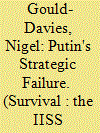

|
|
|
|
|
| Summary/Abstract |
Russian President Vladimir Putin’s invasion of Ukraine was a grand strategic error. He underestimated Ukraine’s cohesion and will to resist, the West’s unity and resolve, the vehemence of Russia’s domestic opposition and the wariness of Russian elites. While Putin’s resort to war reflected Russia’s limited options for trying to halt Ukraine’s drift away from its remaining pull, the war itself has shattered myths about Russia’s own strength. It has exposed economic vulnerability, serious failures of military planning and battlefield execution, and deficits in information and cyber warfare. Mooted compromises involving Ukraine’s partition or neutrality do not yet feel like stable solutions whose terms all sides will accept. Parallel escalation by Russia and the West appears to be the prevailing dynamic. But even if Russia out-escalates the West, the costs of victory will be very large, not least on the home front.
|
|
|
|
|
|
|
|
|
|
|
|
|
|
|
|
| 5 |
ID:
170573
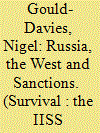

|
|
|
|
|
| Summary/Abstract |
Sanctions have reaffirmed international norms violated by Russia and probably deterred military escalation in Ukraine.
|
|
|
|
|
|
|
|
|
|
|
|
|
|
|
|
| 6 |
ID:
153851
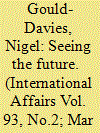

|
|
|
|
|
| Summary/Abstract |
A series of failed predictions, and the erosion of international order, augur an age of uncertainty. Rapid technological change is also fuelling anxiety about the ‘socio-material’ future of collective life. Demand for forecasting is now unprecedented. But the prediction industry has a poor record. Perverse incentives exacerbate the problem: the biggest pundits make the worst predictions. Some also worry that this industry legitimizes the preferred future of powerful interests. Forecasting should be a rigorous professional activity that is held to account, reviews its record and revises its practices. Complexity and chaos impose limits on prediction, but not decisive ones. Big data can play a big role, but needs the discipline of human judgement rich in history and detail. Organizations should create the incentives and culture that foster expert predictions which leaders listen to. This is hard, but good precedents exist. The costs of not doing so are demonstrably high.
|
|
|
|
|
|
|
|
|
|
|
|
|
|
|
|